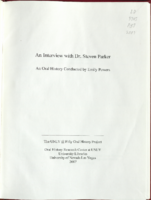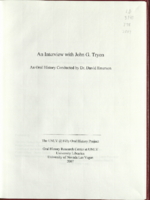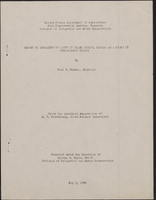Search the Special Collections and Archives Portal
Search Results

Julian Eusebio oral history interview: transcript
Date
Archival Collection
Description
Oral history interview with Julian Eusebio conducted by Cecilia Winchell, Jerwin Tiu, and Stefani Evans on June 01, 2022 for the Reflections: the Las Vegas Asian American and Pacific Islander Oral History Project. In this interview, Eusebio discusses his childhood in the Philippines countryside, helping his parents farm and harvest rice. After moving to Manila for college, Eusebio studied architecture and illustrated for comics and magazines. After moving to Los Angeles, California, Eusebio started a construction business, doing landscapes and constructing swimming pools for celebrities such as Michael Jackson. In 1992, he opened another branch in Las Vegas, Nevada. After retiring in 2010, Eusebio took up painting again and cites his favorite artists as Norman Rockwell and Rembrandt. In the remainder of the interview, he discusses his drawing process and how he started showing his artwork throughout the Las Vegas Clark County Library District.
Text

Interview with Katsumi Furitsu, with Janet Gordon, May 13, 2005
Date
Archival Collection
Description
Text

Interview with Philip Wymer Allen, August 26, 2004
Date
Archival Collection
Description
Text

Transcript of interview with Kevin Brady by David G. Schwartz, September 7, 2016
Date
Archival Collection
Description
Text

Transcript of interview with Dr. Steven Parker by Emily Powers, December 19, 2006
Date
Archival Collection
Description
Text

Transcript of interview with John G. Tryon by Dr. David Emerson, February 21, 2006
Date
Archival Collection
Description
Text

Report on water spreading in Clark County, Nevada as a means of controlling floods, May 9, 1949
Date
Archival Collection
Description
Report on the efficacy of water spreading to disperse flood water in Southern Nevada. Under the immediate Supervision of A. T. Mitchelson, State Project Supervisor. Prepared under the direction of George D. Clyde, Chief, Division of Irrigation and Water Conservation
Text

Gregory Koehler oral history interview: transcript
Date
Archival Collection
Description
Oral history interview with Gregory Koehler conducted by Claytee D. White on May 15, 2019 for the Remembering 1 October Oral History Project. Koehler begins talking about his family, early life, and occupation. He explains the line of jobs he has had, his history with firefighting, and how he moved to Las Vegas, Nevada in 2003. Koehler then recalls how he had attended the Route 91 Festival concert and the events that unfolded during the shooting. He describes what he saw, felt, and how he tried to help the people who were shot. Lastly, he talks about the aftermath of the event and the struggles he had gone through.
Text
Aplin Family Scrapbooks
Identifier
Abstract
The Aplin Family Scrapbooks (1927-1971) consists of four handmade scrapbooks compiled by Hilda Aplin. The scrapbooks contain photographs, correspondence, newspaper clippings, and handwritten captions. The majority of the collection focuses on Hilda and Charles Aplin’s involvement in the Fraternal Order of Eagles and Las Vegas Eagles Auxiliary #1213. Also included is a photograph album that details the family’s activities from 1927 to 1959, including notable locations around Las Vegas, Nevada such as Lake Mead, Hoover Dam, Mt. Charleston, and annual Helldorado parades.
Archival Collection
Walking Box Ranch Collection
Identifier
Abstract
The Walking Box Ranch Collection (1917-2011) includes material collected by the University of Nevada, Las Vegas (UNLV) Public Lands Institute on the Searchlight, Nevada ranch. Materials include a maps related to the construction and operation of the ranch, a pair of chaps owned by Rex Bell, Jr., and color slides of the ranch. Also included are photographic prints of Rex Bell and Rex Bell, Jr., and newsclippings related to the film and political career of Rex Bell. A small number of newsclippings pertain to the career of Rex Bell, Jr.
Archival Collection
